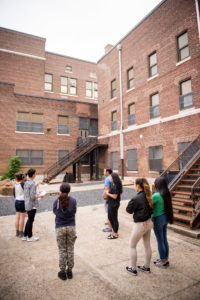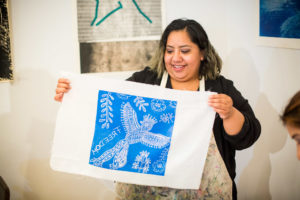



Through equity and shared power, BYOP is a new strategy to promote cultural life in south Philadelphia.
WatchMagda Martinez - Former Programs Director, Fleisher Art Memorial
Heal. Resist. Grow. A community garden in South Philadelphia keeps communities rooted in times of upheaval.
ListenRoberto Bedoya - BYOP Adviser
It’s not about changing your end goal, but finding new ways and new people to help reach that goal.
WatchThe discovery of lead paint at the site of VietLead's planned garden changes the scope of Refugee Day.
ListenBring Your Own Project (BYOP) is a creative place-keeping endeavor that puts Fleisher Art Memorial’s spaces, resources, and experience into the hands of community members as a means to tell and preserve their story, identity, and traditions during a time of rapid transformation in South Philadelphia.
BYOP explores cultural equity and shared power, as Fleisher seeks new strategies to collaborate with community partners through art and creativity. Together, the goal is to honor, preserve, and promote cultural life in South Philadelphia by dismantling the barriers that prevent many children and adults from engaging with arts institutions.
Women Organized Against Rape
Fleisher partnered with Women Organized Against Rape, connecting with Latina community members who had shared cultural and social roots as migrant women. Together as sisters, they took on the challenge of confronting the adversities in their lives that provoked fear and blocked them from freely expressing their emotions. Through hands-on art-making, a strong and supportive social fabric formed, built on inclusion, trust, and safety. Inspired, they formed their own artist collective Valientes Guerreras (Brave Warriors). Guided by artist facilitator Laura Deutch, the group learned to tell their story through collage, photography, printmaking sewing, cooking, and more. Leaving a legacy emerged as a key theme, and the idea to create a large curtain from recycled materials, including 60,000 soda tabs, was born. The piece weaves symbols and pieces from compañeras (partners) no longer physically here, but spiritually present. Each woman’s individual story is embedded in the piece, bound by strength, determination, and creative will.
The result is an alternative vision to the idea of a wall that keeps people out. Instead, Valientes Guerreras offers a porous curtain that transforms cosas tiradas (things thrown away) into something beautiful, demanding that we see things differently and shining light on the potential of what’s possible when we all work together in our community.
VietLead
Fleisher partnered with VietLead, collaborating with students, parents, and elders to advance their vision for a community garden in South Philadelphia, a healing space for resilient practices of gardening, cooking, and art-making. As a community of refugees from the Vietnam War, there is intergenerational trauma, with stories of poverty, war, escape, and imprisonment whispered but rarely spoken. In interviewing their families, students saw promise in learning their own histories through stories of land, food, and farming that evoked nostalgic memories of a former home.
With the vibrant gardens on South Philadelphia’s porches as inspiration, the idea for a community garden at nearby Horace Furness High School was born. It would be a place of calm and peace for children and adults to gather, a space to grow healthy crops and connect with their cultural roots. Growers of Vietnamese, Cambodian, and Bhutanese communities expressed that growing was a method to reconnect with the land and heal as a community. With the support of artist facilitator Miki Palchik, students improved upon their existing work and organizing practices, creating community cookbooks, designing gardens, creating videos, and printing posters. Every work of art was an opportunity to question, teach, share, and connect with others.
However, when it was time to make the garden a reality, VietLead discovered that the site was contaminated with lead, an issue faced by schools throughout Philadelphia. The vision for the garden propelled students and growers to use their voices to fight for safe schools, contacting city officials, testifying at council meetings, and organizing petitions. Art and creativity became an effective way to express their outrage and share their hope. The result was a vote by the Philadelphia Board of Education to clean the garden site. United by vision and uplifted by victory, this community garden represents the work of students, parents, and elders to advocate, empower, and fight for their rights.
Bring Your Own Project has been supported by The Pew Center for Arts & Heritage.